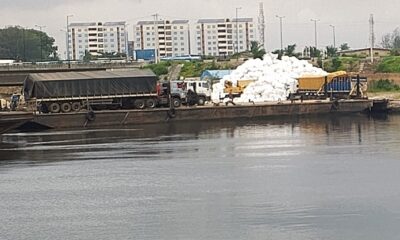Analysis
SEREC Indentify Reasons Nigeria Has Become Dumping Ground For Empty Containers

BY GBOGBOWA GBOWA
The Sea Empowerment Research Centre (SEREC) has provided an informative evaluation of the immediate and remote causes; empty boxes used in shipping imports to Nigeria are abandoned at various seaports by shipping lines from Europe, Asia and America.
The practice which negates the international shipping lines obligations is believed to be abusing operational spaces within Nigerian ports, with clear signs of inevitable and upcoming congestion.
The SEREC position paper signed by Head of Research Fowdr. Eugene Nweke and published verbatim below, quoted freight forwarders as saying that an estimated 65,000 to 100,000 TEUs of empty containers are currently dumped within the nation’s ports, and purportedly littering the, and posing health risks and environmental pollution.
UNRAVELING THE UNDERLYING REASONS WHY EMPTY CONTAINERS ARE DUMPED, LITTERING THE NIGERIAN SHIPPING AND PORT SPACE
Preamble
Nigerian freight forwarders have long complained about the practice of shipping lines discharging laden containers in Nigeria and then sailing back to origin ports with only a few export containers, leaving behind over 97% of empty containers. This practice has been attributed to the cost implications of freighting back empty containers, which has resulted in a significant backlog of empty containers in Nigerian ports.
The Problem
According to freight forwarders, an estimated 65,000 to 100,000 TEUs of empty containers are currently dumped and littering Nigerian ports, posing health risks and environmental pollution. Moreover, about 45% of containers circulating in the Nigerian shipping space are reportedly “lickety” containers that fall under the classification of unseaworthy containers.
SEREC Findings
The Sea Empowerment and Research Center (SEREC) conducted a review of freight forwarders’ claims and discovered that the cost of freighting empty containers back to Europe, Asia, the US, and the Middle East from Nigeria varies greatly depending on several factors, including the point of loading, destination, carrier, and market fluctuations.
Comparative Studies
SEREC undertook a comparative study to determine the exact average rate for freighting back empty containers from Nigeria to China. Based on recent data, the estimated costs are:
– 20ft Container (FCL): $2,000-$4,000 (or £5,351-£5,914 for a different route)
– 40ft Container (FCL): $3,500-$6,000 (or £10,167-£11,236 for a different route)

– Less than Container Load (LCL): $150-$500 per cubic meter
Average Transit Times
The sea freight transit time from Nigeria to China typically takes 21-26 days, while air freight takes 1-3 days.
Cost Burden
SEREC estimates that it would cost a ship with a loading capacity of 4,500 TEUs approximately $9 million to freight back empty containers to the origin port. This is considered a significant cost burden on shipping lines.
Potential Solutions
To address the issue of dumping empty containers in Nigerian ports, SEREC recommends:
- Encouraging Nigerian businesses to increase their exports to reduce the number of empty containers.
- Investing in better port facilities and management systems to streamline container handling and reduce congestion.
- Establishing efficient container return systems to reduce the number of empty containers left in ports.
Recommendations
SEREC strongly recommends that shipping lines, port authorities, and government agencies work together to develop and implement effective container management strategies. Additionally, there is a need to improve port facilities and technology to enhance efficiency and reduce congestion. The government should also encourage Nigerian businesses to increase their exports to balance out the number of empty containers.
Conclusion
In conclusion, SEREC wishes to remind shipping lines that, as provided in the Customs Act 2023, containers fall under the category of temporary importation (TI). After three months’ grace, containers circulating in the Nigerian shipping space shall be converted to dutiable imports. SEREC believes that it is in the best interests of shipping lines to do the needful and respect trade terms.
Thank you for your attention.
Eugene Nweke
HOR @ SEREC



































